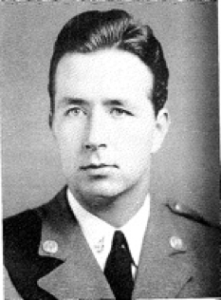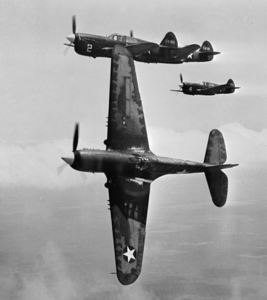Scroll of Honor – Rufus Randolph McLeod, Jr.
Rufus Randolph McLeod, Jr.
How the world changed in those four years. When Rufus Randolph McLeod, Jr. arrived on the Clemson campus in the late summer of 1938, no one could have imagined what lay in wait for the boys of the Class of 1941.
campus in the late summer of 1938, no one could have imagined what lay in wait for the boys of the Class of 1941.
“Black Dog” McLeod was a general science major from Hartsville, where his father served as the postmaster, a political appointment in those days. McLeod demonstrated leadership ability and a military aptitude. He was a member of Scabbard and Blade, the military honor society, and the Calhoun Literary Society. As a junior, he was selected as a graduation marshal. Following the completion of ROTC training at Fort McClellan, Alabama in the summer of 1940, McLeod returned to campus as a cadet lieutenant colonel and commander of the First Battalion, First Regiment of the Cadet Brigade.
By the time McLeod and his classmates graduated in the spring of 1941, the world situation had deteriorated. In March, Congress had passed and President Roosevelt had signedinto law the Lend-Lease Act allowing the United States to provide material aid to Great Britain, which was struggling to defend and feed its people against assaults from the German air force and submarine fleet.
McLeod, upon receiving his commission as a second lieutenant, was ordered to Camp Croft at Spartanburg. He volunteered for flight training and was sent to Texas, where he studied and flew at Hicks, Goodfellow and Foster Fields before earning his wings in April 1942.
McLeod was next assigned to Bolling Field in Washington, D.C. and was promoted to first lieutenant. In August, he married Margie Conwell of Atlanta. Soon thereafter, McLeod was alerted for overseas deployment.
Despite the sneak attack by the Japanese that had thrust the war upon the United States, Roosevelt and his military advisors, in consultation with their British allies, had adopted a “Germany First” strategy. Yet by the autumn of 1942, no US ground forces had yet attacked the Germans. That was about to change.
Operation Torch, a joint British-US invasion of French North Africa, was launched on

November 8, 1942. Now assigned as a pilot in the 60th Fighter Squadron, McLeod was soon flying from captured airfields in Tunisia. On December 6, 1942, McLeod was part of a fighter escort mission that had flown to Telergma airfield in Algeria. Upon returning to his base, McLeod’s P-40 Warhawk crashed, killing him. He was the first pilot from the squadron to be killed.
First Lieutenant Rufus Randolph McLeod, Jr. was awarded the Purple Heart and was buried at the North African American Cemetery in Carthage, Tunisia. He was survived by his wife, his parents and three sisters.
For additional information about Lieutenant McLeod see:
https://soh.alumni.clemson.edu/scroll/rufus-randolph-mcleod-jr/
For more information concerning Clemson’s Scroll of Honor visit:
https://soh.alumni.clemson.edu/
